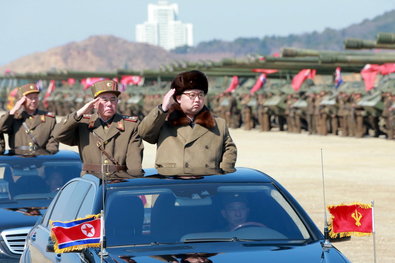
Is China’s Policy Toward North Korea Changing?
President Obama and President Xi Jinping of China are scheduled to meet privately today as world leaders gather in Washington to discuss nuclear security. The two leaders will likely talk about rising tensions in Asia given North Korea’s nuclear test in January, and its long-range rocket launch in February. Is Beijing’s decision this month to support tougher United Nations sanctions against North Korea evidence that China’s attitude toward North Korea is changing?
* be scheduled to ~ = ~할 예정이다/ gather = 모이다[모으다]/ nuclear security = 핵안보/ likely = ~할 공산이 있는, ~할 것 같은[것으로 예상되는]/ rising tensions(주로 복수) = 고조되는 긴장/ given ~ = ~을 고려해 볼 때/ long-range = 장거리를 가는/ sanctions(주로 복수) against ~ = ~대한 제재/ attitude toward ~ = ~에 대한 태도
 북한에 대한 중국의 (외교) 태도가 바뀌고 있나요?
북한에 대한 중국의 (외교) 태도가 바뀌고 있나요?
1. Expect Some Change in Policy But Not a Lot
While China will likely accede to growing diplomatic and economic pressure on North Korea, it will not endanger its conception of regional order.
2. China’s Patience With North Korea Is Wearing Thin
If the choice for Beijing is between trading with North Korea and trading with the U.S., the answer is obvious.
3. A Shift in China’s Policy Is Unlikely
China also has other geopolitical priorities that it can’t ignore, namely maintaining stability on its borders and preventing the U.S. and South Korea from reunifying the peninsula on their terms.
4. China’s North Korea Policy Is Definitely Changing
By supporting U.N. sanctions on North Korea earlier this month, Beijing seems to be expediting North Korea’s bankruptcy and signaling political abandonment of its traditional ally.
Sample Essay
A Shift in China’s Policy Toward North Korea Is Unlikely
Time and time again, American experts have wondered whether China was substantially shifting its policy toward North Korea only to discover that was not the case. Of course, like the United States and the rest of the international community Beijing wants Pyongyang to give up its nuclear stockpile. And Washington has long felt that given China’s influence in Pyongyang — it’s the North Korea's largest trading partner — the road to denuclearization runs through Beijing. But China also has other geopolitical priorities that it can’t ignore, namely maintaining political and economic stability on its borders as well as preventing the United States and South Korea from reunifying the peninsula on their terms. A united Korea allied with Washington on China’s border would be bad news for Beijing given its continuing rivalry with the United States in Asia.
Once again, China’s recent moves have triggered speculation about a substantive policy shift. Once again, that is unlikely. It went along with the tougher sanctions imposed by the United Nations Security Council — sanctions it calculated would not cause instability in North Korea — to show displeasure with Pyongyang’s recent bad behavior and to try to head off any further provocative moves that might lead to conflict. But Beijing has also made it clear, as Foreign Minister Wang Yi recently emphasized, that “The sanctions are a necessary measure, ensuring stability is an urgent matter and negotiation is a fundamental path.” In short, China has taken a step in the direction that the United States wants, to increase international pressure on North Korea. Now Washington has to reciprocate by more seriously pursuing a dialogue with Pyongyang intended to build peace on the peninsula and to secure denuclearization.
Today's meeting between Presidents Obama and Xi Jinping on the margins of the Nuclear Security Summit may provide new clues as to whether Washington will move down that road and whether China’s shift will last. For now, Beijing seems to have moved out smartly with implementing sanctions; instructions have been sent to the border regions, banks and businesses have been warned and inspections of ships and goods have been heightened. But this initial period of vigilance could ease over time if China believes the United States isn’t meeting its concerns.





![]() 북한에 대한 중국의 (외교) 태도가 바뀌고 있나요?
북한에 대한 중국의 (외교) 태도가 바뀌고 있나요?






